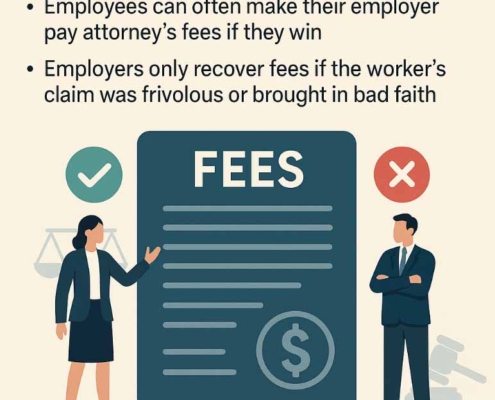

I-9 Compliance Guide: Requirements, Penalties, and Best Practices for Employers
I-9 compliance ensures employers properly verify work eligibility, avoid costly fines, and stay aligned with federal employment regulations. This guide explains requirements, penalties, and best practices to help businesses maintain accurate records and prepare for inspections.

Separation From Employment in California: Rights, Severance, and Legal Agreements
California separation agreements cover employee rights, severance pay, and post-termination limits, clarifying lawful waivers, negotiation paths, and invalid non-compete restrictions. Seek legal counsel to negotiate terms, secure wages and benefits, preserve unemployment eligibility, and avoid clauses that overreach California law.

8 Ways to Get Attorneys’ Fees In California Employment Lawsuits
In California employment lawsuits, employees can often make their employer pay attorney’s fees if they win, but employers only recover fees if the worker’s claim was clearly frivolous or brought in bad faith.

What Is a Wage Statement? A Complete Guide to California Pay Stub Requirements
California wage statement rules require accurate, itemized pay stubs showing hours, rates, deductions, and employer details for every pay period. Employers must follow strict regulations, maintain records for three years, and provide timely wage statements or face penalties and legal action.

Do Jobs Still Test for Weed in California? AB 2188 & SB 700 Rules for Employers
California’s AB 2188 and SB 700 shift workplace drug testing from past cannabis use detection to active impairment screening. Employers must adopt compliant testing methods that protect employee rights while ensuring workplace safety under the new laws.

Employee Rights California: 10 Important Workplace Protections in 2025
California employees in 2025 have key workplace protections covering pay, breaks, discrimination, safety, leave, retaliation, and wrongful termination. Know your rights under state and federal laws to safeguard fair treatment, prevent harassment, and maintain safe, equitable working conditions.

DLSE-NTE Notice Requirements for Employers under California Labor Code 2810.5
Employers in California must comply with DLSE-NTE notice rules under Labor Code 2810.5, detailing pay, employer information, and insurance. The law outlines disclosure requirements, exceptions, template issues, and guidance for ensuring accurate and timely employee notifications.

Revocation Period Rules for Severance Agreements in Business Sales and Employee Terminations
Severance agreements in business sales require precise revocation period rules to protect both employer and employee rights across jurisdictions. This guide outlines legal considerations, state-specific requirements, and key terms that help keep severance contracts valid and enforceable.

Paid Holidays by Law in California: Employer Rules for Time Off and Holiday Pay
California law does not require employers to provide paid holidays, but clear policies can outline time-off and holiday pay practices. Employers must accommodate religious observances, follow payroll timing rules, and may offer extra holiday pay voluntarily.
